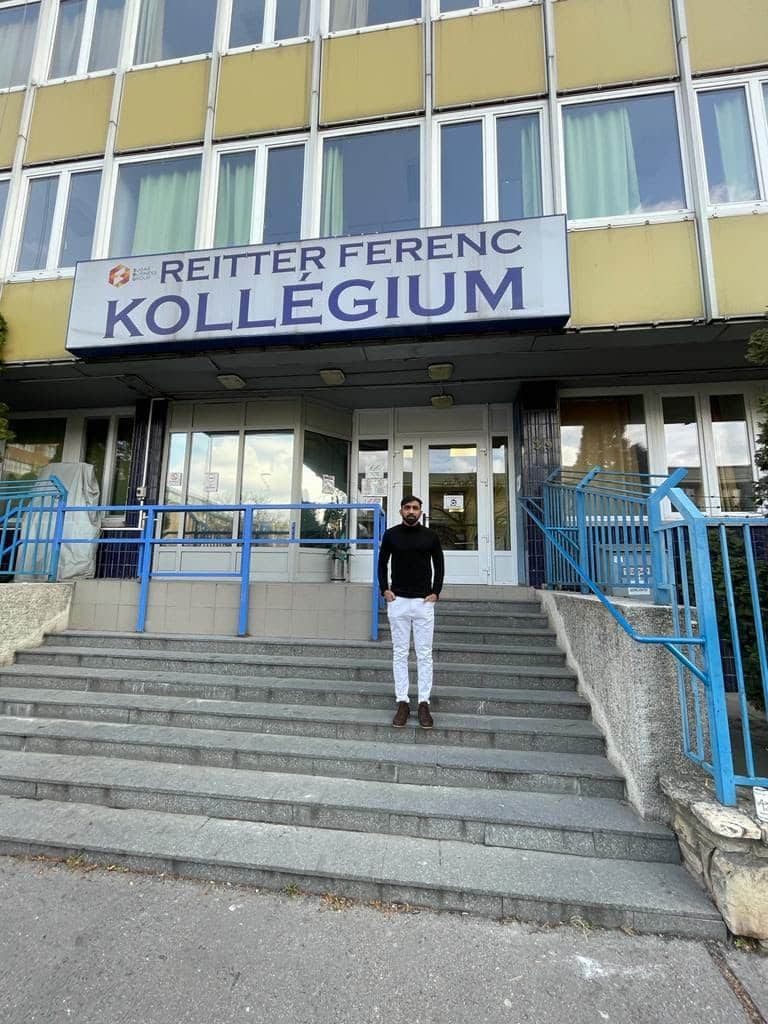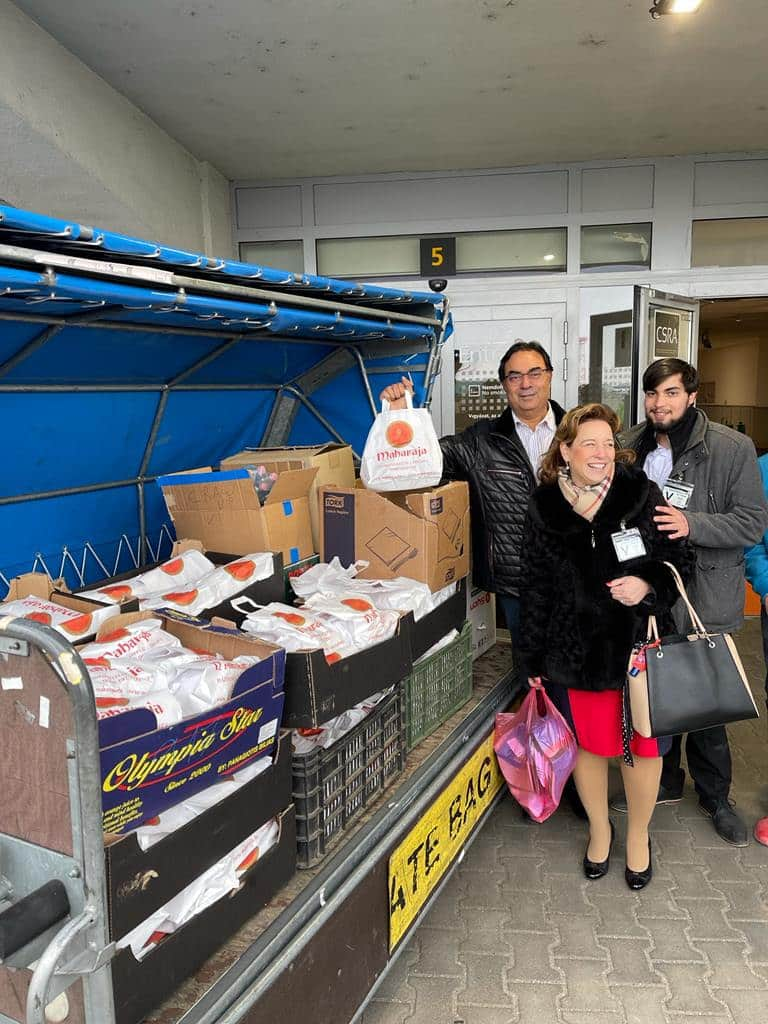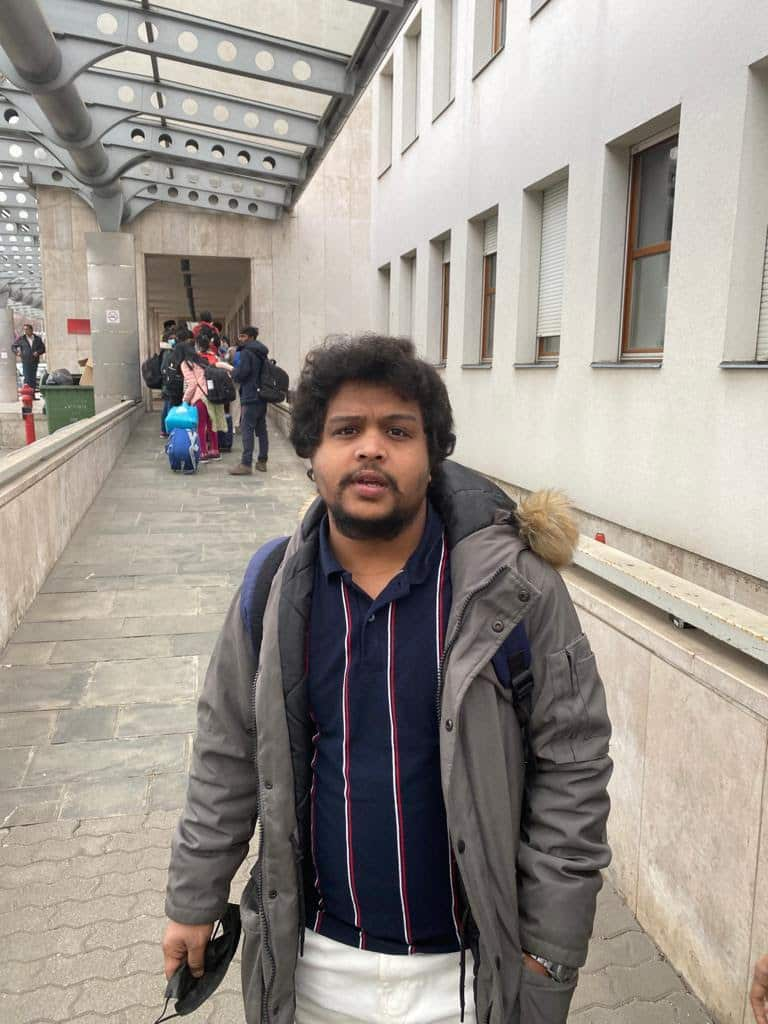



Hungary has turned out to be a major stopover for those fleeing from the conflict in Ukraine. Among those making a beeline for Budapest are Indian students who have been entering Hungary through the Zahony Border Crossing. Typically Viktor Orban's Hungary has not been very welcoming of refugees. But in the wake of the Russian attack on Ukraine, Orban has spoken about the need to differentiate between a migrant and a refugee.
The easing up of the Hungarian border has made the country a popular safe haven for those scarred by the Russian bombings and battered by the long train journey from Ukraine. Fleeing Indian students coming to Hungary are discovering that more people in Budapest are conversant in English compared to Ukraine, and there are two currencies - Euro and Hungarian Forint - that are valid.
They are content to negotiate the new terrain even though several students have complained of the pity exchange rates they got for the Ukrainian Hryvnia, which continues to tank.
After travelling almost 300 km to the capital city of Budapest from the Zahony Border, Indian students have been accommodated in a few hostels and dormitories around the city. The Reitter Ferenc Dormitory (RUF) is a short distance from the heart of the city. Here, warm rooms and blankets provide some much-needed comfort to Indian students.
 Shubham Gupta at the Reitter Ferenc Kollegium in Budapest. (Photo: Danish Khan)
Shubham Gupta at the Reitter Ferenc Kollegium in Budapest. (Photo: Danish Khan)Shubham Gupta, a sixth-year medical student, left Kharkhiv on March 1, reaching Zahony Border Crossing on March 3.
"Kharkhiv to Lviv took over 30 hours, instead of the usual 12 to 13 hours. We had to bribe people all the way to make that journey and continue further to reach Hungary," said Gupta. He lost his father last year, and his mother and brother are incredibly worried.
Ramdev Soni is from Rajasthan and is a third-year student at the same university as Gupta. "We started together but in the trains we made some friends," said Soni.
Soni benefited from the hospitality of a Ukrainian family in the train. But not all were so lucky.
Kamal Saini describes the train journey as unlike anything he'd experienced before. "I had to pay even to use the power bank to keep my phone charged." Saini also got a taste of racism in Ukraine as the situation worsened. "The language is a barrier, but it seems the people were ready to pickup a fight on any minor issue."
Some of the students saw Russian tanks entering Ukrainian streets, and also some Russian soldiers getting beaten up by the locals.
A few other students, who did not wish to be named, were also upset with the attitude of their universities and felt that the Indian embassy in Ukraine could have taken a firm decision to ask them to leave the country.
"Till the very last, our university maintained that we risk losing a year if we left. Some of us have just few months of study left and the prospect of repeating a year looked too daunting. Our parents have paid so much money and the last thing we want is add to their financial burden," said a student who wished to remain anonymous.
"A one-side fare to India went up from Rs 28,000 to over Rs 1 lakh in a matter of two days," said another student, although relieved that she and her friends were now in the safer confines of a Budapest dormitory.
The students recounted experiences of living inside metro stations, dodging missiles while grocery shopping, and now getting news of their university buildings being destroyed.
Not all students were forthcoming, though. Some were shy, some uninterested, some too busy trying to make sense of what to expect next. But what was common was the urge to know when they would be on a flight to India. The dormitory has students from other countries too.
If not for the palpable tension in the air, and the worry about breakfast, it could be mistaken for a normal international hostel. It is in some ways indeed an international hostel, except that it is a war that has got them together. Suddenly, there is some excitement as some students take the flight of stairs down to the ground floor. "Their names are on the list. Shall we also go to the airport," asks one student excitedly to another group that has gathered near the entrance.
The students who had packed their bags and were ready to leave the dormitory were intimated by three engineers working for TCS who were volunteering over the weekend. Sunil Kumar Genji , Riyas Syed Ibrahim, Rino J. A. were in charge of shepherding 20-odd students from the dormitory to Hotel Hungaria City Centre.
Getting on the list, and way back homeThe list has 18 students, all girls. Just two more slots left. Someone informs the volunteers that there was a girl student with kidney stones who was feeling rather down; the volunteer trio put her on the list. They had one more spot left, and as was the brief, they wanted a girl to fill it. "We are four of us from the same place (in India) and we would rather stick together," said a girl when asked whether she wanted to be on the list.
Twenty minutes on a bus (Route 30), and a five-minute walk later, we reach Hotel Hungaria city centre. The hotel lobby is overtaken by students. Hired by the Indian Embassy in Budapest, the hotel serves as the nodal meeting point - Indian students from hostels/dormitories around the city are brought here to be taken to the airport by bus.
The desperation to be on the flight to India is such that students stay put in the lobby lest they miss their seat on the bus to airport. There's some arrangement for food - after Riyas and Sunil plead with the students to eat something, some students start moving to the area where the food is being served. The aroma of fresh Indian food, too, does the trick, and the trickle soon turns into a deluge.
 Kulvinder Singh (left) and his wife Tunde. (Photo: Danish Khan)
Kulvinder Singh (left) and his wife Tunde. (Photo: Danish Khan)Much of that is made possible due to the generosity of Kulvinder Singh and his Hungarian wife Tunde, who run the hugely popular Maharaja Restaurant in Budapest. With the help of a mini-army of volunteers, hot food made at the restaurant is served to the students. "It's still a long way for them," said Singh while moving around the eating area. More than 200 people have taken meals - veg biryani, rotis, chhole, pasta - and an equal number has to be transported to the airport.
"The military aircraft do not have catering, so we have prepared meals for the students and the IAF crew for the journey back to India," said Tunde.
Kulvinder and the Hungary-born Tunde met as students in Vienna, and now own four branches of Maharaja. "There are no gurudwaras in Hungary, so what we are doing is akin to a langar," said Tunde, even as she instructs her two sons on service. Tunde hurries to add that while Hungarians do not have of a concept of langar, she knows about it through her husband and their visits to India.
Budapest has 3,500-4,000 Indians, said Singh. Most of them are professionals, like Sunil and Riyas, or students. The relatively small Indian community has bandied together to give a helping hand to the Indian Embassy in Hungary. Compared to missions in bigger cities like London and Paris, Budapest has a modest number of Indian diplomats.
"Indian Embassy is doing the evacuation and Bharatiya Samaj of Hungary, ISKCON, Maharaja and several volunteers have come together to provide food and catering at different venues. Around 1,500 Indian students are being fed every day courtesy Maharaja restaurant and ISKCON," said Anoop Gupta, a professional based in Budapest, who has been volunteering for a week.
Meanwhile, the students having finished their meals have been taken to the airport in coaches. Three flights are scheduled to take them home - two commercial airlines and a special IAF aircraft - from Terminal 1, which is reserved for special planes. Students from centres other than RUF are at the airport, too.
The girl who was afraid her kidney stones might get worse is in the queue of students who've deboarded the bus. Also in the queue is Prasad from Hyderabad.
"Yes, I am happy to be here," Prasad said. A medical student in Ukraine, Prasad's excitement to share more of his experience was cut short as the students ahead of him had quickly moved and he had to keep pace.
 Prasad, at the airport in Budapest. (Photo: Danish Khan)
Prasad, at the airport in Budapest. (Photo: Danish Khan)Once inside the airport the students sound chirpier. The tone and tenor of their conversations is far more cheerful. Some are still thinking of their friends, but with regular rescue flights leaving Budapest, and being at the airport themselves, they are more hopeful. A diplomat from the Indian High Commission in London is present at the Budapest airport.
The special IAF aircraft to ferry the students is the US-made C 17 Globemaster. A key member of the 11-member crew described it as "a tank that rides like a Ferrari". When it touched down at 3:20 pm (Budapest time), it was the third time it had made its journey from Delhi to ferry the stranded students. Apart from complementing the commercial flights, the aircraft can also carry pets which some of the students had adopted in Ukraine.
"In the last flight I remember a girl who was with a very frightened cat. Thankfully everything went well," remembers J.K. Singh, C-17 loadmaster, now waiting for the next batch of students - some of them with pets.
Union Minister Hardeep Singh Puri is in Budapest for now and moving around various venues, and looking at the consistently high number of Indian students entering Hungary at the Zahony Border crossing from Ukraine. It will be few more days, if not weeks, of continued hard work and coordination.
1320 students will be evacuated from Budapest today. 4 Delhi-bound flights already taken off. Check-in completed for 2 flights while check-in is currently in progress for what will be the 7th flight of the day. Parents must be waiting to welcome their kids back in India. pic.twitter.com/if8fIqtJyG— Hardeep Singh Puri (@HardeepSPuri) March 5, 2022
Discover the latest Business News, Sensex, and Nifty updates. Obtain Personal Finance insights, tax queries, and expert opinions on Moneycontrol or download the Moneycontrol App to stay updated!
Find the best of Al News in one place, specially curated for you every weekend.
Stay on top of the latest tech trends and biggest startup news.